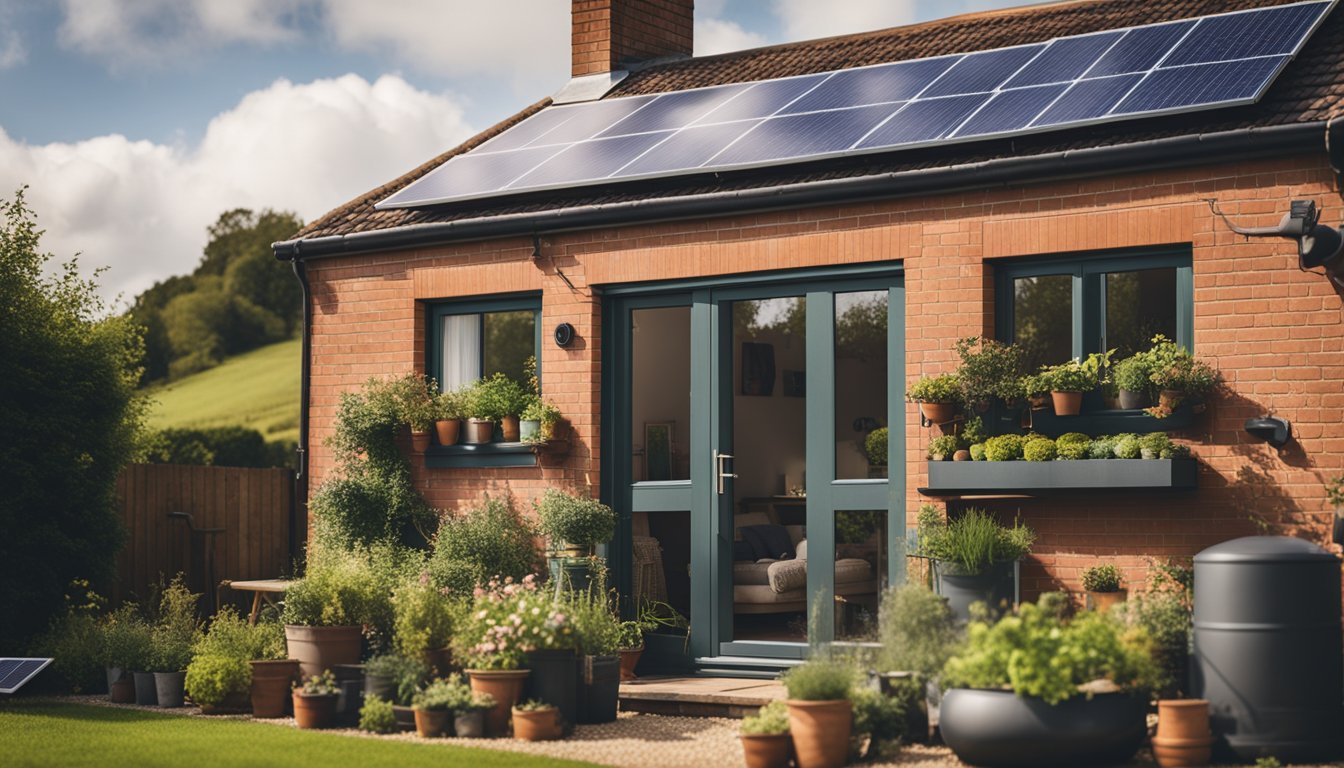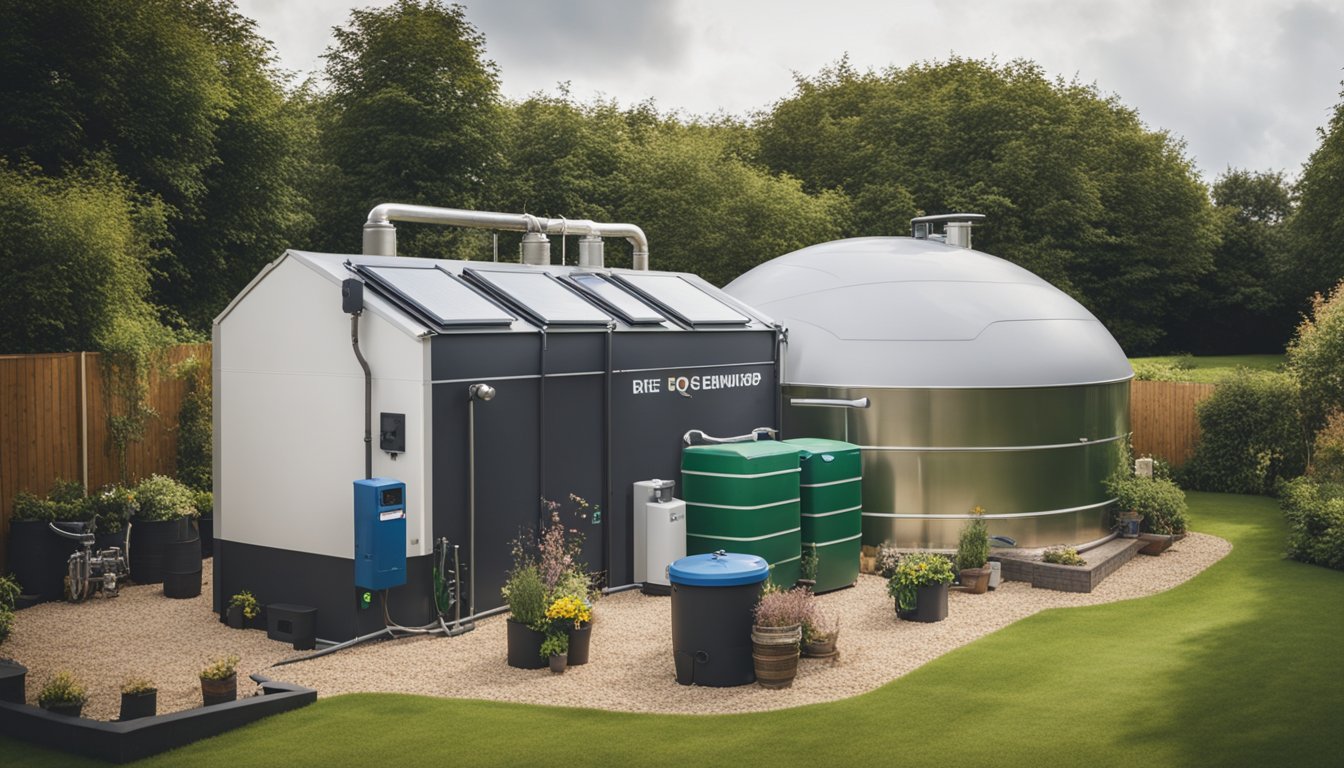Late updated: 07 Oct 2024 08:10
Written by: Eleanor Hartman
Sustainable Benefits Of Using Biogas In UK Homes: Eco-Friendly Energy Solutions
Harnessing biogas for domestic use in the UK offers not only a renewable energy source but also significant environmental and economic benefits. Utilising biogas reduces greenhouse gas emissions by capturing methane from organic waste, transforming it into a valuable energy resource. This process supports sustainable development and aligns with the principles of a circular economy, where waste is minimised and resources are reused continuously.

Biogas technology presents a reliable solution for tackling climate change by converting organic waste into clean energy. The production and use of biogas are seamless, integrating into existing energy systems while providing a steady supply of renewable energy. As more households adopt biogas, we contribute collectively to a sustainable energy future and potentially lower energy costs.
Adopting biogas in our homes not only provides ecological advantages but also economic ones, as households become less reliant on traditional fuel sources. Encouraging the use of biogas aligns with national efforts to achieve carbon targets and supports the growth of bioenergy within local communities. By choosing biogas, we make a conscious decision towards a greener, more sustainable lifestyle.
Key Takeaways
- Biogas captures methane to reduce greenhouse gas emissions.
- Utilising biogas integrates renewable energy into homes.
- Using biogas supports sustainability and lowers energy costs.
Biogas Technology and Production in the UK
Biogas production in the UK leverages advanced technologies and a variety of feedstocks, enabling a sustainable energy source for homes. The use of anaerobic digestion, energy crops, and municipal waste plays a significant role in this process.
Anaerobic Digestion and Conversion Technologies
Anaerobic digestion (AD) is central to biogas technology. In the UK, this process involves breaking down organic materials, such as agricultural wastes and municipal waste, in oxygen-free environments to produce biogas and digestate. Biodigesters are used to facilitate this process by providing the necessary controlled conditions.
Modern AD plants employ various conversion technologies, enhancing the efficiency of biogas production. These technologies include biogas upgrading systems that purify the raw gas to biomethane. As a renewable natural gas, biomethane can be used directly in homes for heating and cooking.
Sources and Types of Feedstocks
Feedstocks for biogas production are diverse. In the UK, agricultural wastes, including animal manure and crop residues, are primary sources. These materials are supplemented by energy crops, such as maize and grass silage, optimised for their high biogas yields. Municipal waste, which includes food and garden waste, is also utilised effectively.
Biomass resources are carefully selected to ensure a steady supply of feedstock. The integration of these various materials not only supports waste management but also reduces greenhouse gas emissions by recycling organic waste. This comprehensive approach strengthens the UK's commitment to sustainable biogas production.
Advancements in Biogas Systems
Recent advancements in biogas systems have focused on improving efficiency and output. Innovations include enhanced biodigester designs and advanced monitoring systems, allowing for better control of the digestion process. These improvements lead to higher biogas yields and improved conversion rates.
Research and development have also introduced new methods for optimising feedstock mixtures. By adjusting the proportions of different materials, we can maximise gas production and improve system resilience. These advancements are crucial for meeting increasing energy demands and supporting the transition to a low-carbon economy in the UK.
Environmental and Economic Advantages

Biogas offers significant environmental and economic benefits for UK homes. By adopting biogas, we can effectively manage waste, reduce emissions, and support rural economies.
Reduction of Greenhouse Gas Emissions
Biogas production substantially reduces greenhouse gas emissions. Organic waste, when left to decompose naturally, releases methane, a potent greenhouse gas. By converting this waste into biogas, we capture methane and utilise it as a renewable energy source. This process mitigates its impact on climate change and supports the circular economy by recycling otherwise harmful emissions. Consequently, biogas contributes to the decarbonisation of the energy sector, aligning with goals for a zero carbon Britain.
Energy Supply and Demand
Biogas contributes to balancing energy supply and demand. It serves as a sustainable energy source that can help meet the UK's growing energy needs. By producing biomethane, biogas can be integrated into district heating systems, reducing reliance on fossil fuels. As a renewable gas, it enhances energy security and stability while supporting the transition towards renewable energy sources. This adaptability makes it crucial for addressing fluctuating energy demands and advancing the SDGs related to affordable and clean energy.
Impacts on Rural Development and Agriculture
For rural areas, biogas provides numerous economic benefits. It promotes rural development by creating jobs and enhancing income through the management of agricultural residues and organic waste materials. By encouraging effective waste management, biogas systems improve agricultural productivity and soil health. This supports local farming communities and contributes to broader economic resilience. Overall, biogas fosters a symbiotic relationship between agriculture and energy production, benefiting both the environment and rural economies.
Frequently Asked Questions

Biogas offers numerous benefits for UK homes, including a reduction in greenhouse gas emissions, cost savings, and more efficient waste management. By using biogas, households can contribute to a more sustainable environment while also taking advantage of a reliable energy source.
What are the environmental advantages of using biogas in domestic settings?
Biogas production helps reduce the release of methane, a potent greenhouse gas. By capturing and utilising this gas, we can significantly lower emissions that would otherwise contribute to climate change. Furthermore, using organic waste to produce energy mitigates the environmental impact of waste disposal.
How does biogas production contribute to sustainable household energy?
Biogas provides a renewable energy source that is derived from organic materials such as food scraps and agricultural residues. By harnessing this energy, households can reduce their reliance on fossil fuels. This contributes to a more sustainable and self-sufficient energy system within the home.
What are the economic benefits for UK homeowners switching to biogas?
Switching to biogas can lead to considerable cost savings on energy bills. As a renewable resource, biogas can provide a stable and often cheaper alternative to conventional energy sources. Additionally, government incentives may be available to support the installation of biogas systems, further enhancing its economic appeal.
In what ways does biogas use reduce the carbon footprint of UK homes?
The use of biogas as an energy source helps lower the carbon footprint of homes by replacing fossil fuel consumption. This transition results in fewer carbon emissions associated with heating and cooking. By opting for biogas, we commit to a more carbon-efficient lifestyle that aligns with the UK's environmental goals.
How reliable is biogas as a primary source of energy for home use?
Biogas offers a consistent and reliable energy supply when integrated with domestic energy systems. Although production may fluctuate, storage technologies can help maintain a steady supply. With proper planning and implementation, biogas can serve as a dependable energy source for many households.
What is the impact of biogas technology on waste management in the UK?
Biogas technology provides a sustainable waste management solution by converting organic waste into energy. This process reduces landfill use and associated environmental issues. Furthermore, the by-products of anaerobic digestion can serve as valuable fertilisers, promoting a circular economy and enhancing agricultural productivity.